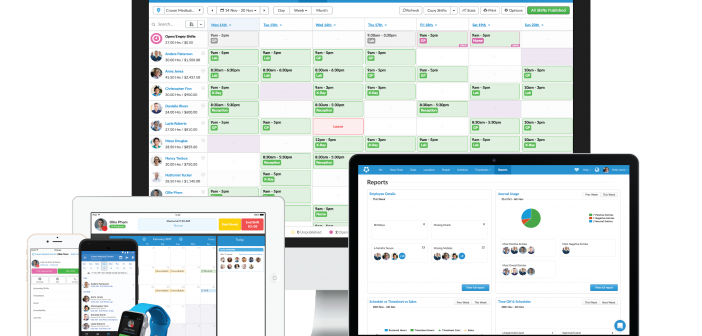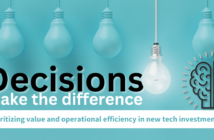Rapid advancements in technology are improving guest experience, hotel operations.
by NICK FORTUNA
In the very near future, guests who order room service at some hotels won’t have to dig through their pockets for a tip or feel like they’re wasting a hardworking bellhop’s time if it takes them awhile to answer the door. That’s because room-service robots, which have been displayed at AAHOA conventions and are in a small number of hotels, will become increasingly common in hotels this year, reducing the manpower needed to provide quality guest services, according to Dhar Patel, chief financial officer for Hospitality1, a direct wholesaler of electronics and automation equipment to the hospitality industry.
The cylindrical robot bellhops, which Patel said look similar to “R2-D2 without the legs,” typically measure about 3 feet tall and roll through hotel hallways on wheels. Hotel staffers load up the central compartment with whatever items a guest requests, such as toothpaste, fresh towels or food, and send it on its way using an LCD touch screen. When it gets to the guest’s door, the guest opens the top of the robot, removes the items and touches the screen to send the robot back to the lobby.
“When the robot gets to your room, you get a call saying room service is at your door,” Patel said. “The robot knows the layout of the hotel and has sensors so it doesn’t bang into the walls. It’s sort of like those automated vacuums that go around your floor. They learn the area, and the more you send them to rooms, the more efficient they get. I expect that we’ll see more and more of these being put into use this year.”
Robotic bellhops are just one of the many technological innovations that are rapidly enhancing the guest experience and making hotel operations more efficient. Patel said other advancements include smart TVs that connect to servers and allow private messaging between the hotel and its guests. When the guest turns on the TV, a customized splash page is displayed that provides information about the hotel, weather updates, access to services such as room service and the ability to control room lighting, temperature and the opening and closing of drapes. Guests can connect to the TV with their wireless devices to view their favorite movies and play video games.
In the common areas, static and interactive messaging boards are becoming increasingly common, Patel said. A static board provides scrolling messages or images to improve hotel aesthetics, and the interactive touch-screen boards allow the guest to call up information about hotel amenities, weather, airports, taxi services, restaurants and entertainment venues.
For hotels looking to impress their guests and boost their bottom line, there are a wealth of options in today’s ever-evolving technology marketplace. Here’s a look at just a few.
Keyless guestroom entry
When guests misplace their plastic guestroom keycards, it can be a major inconvenience for both the hotel and guest. To address this issue, the Swedish company ASSA ABLOY introduced its Hospitality Mobile Access system, which gives guests the ability to gain guestroom access using personal devices such as a smartphone.

ASSA ABLOY Mobile Access
When a guest is assigned a room, the technology generates an encrypted digital code that is then transmitted to a downloadable app on a guest’s device via a secure communications channel. Once a guest’s device is within proximity of the guestroom’s Bluetooth Low-Energy (BLE) reader, the digital key information is securely transmitted to the door lock to unlock it. Hospitality Mobile Access allows guests to skip the check-in process and proceed directly to their room, and it frees up frontline staff to serve other guests.
Hotel properties that already have radio-frequency identification (RFID)-based door locks only require the addition of a BLE reader, but door locks lacking RFID capability would need to be upgraded with both an RFID board and BLE reader.
Riise Walker, marketing manager at ASSA ABLOY Hospitality, said the entry system provides a higher level of security than plastic keycards because of its encryption of digital key data and the use of secure communications channels to transmit information. This eliminates issues such as unauthorized keycard cloning, which has been problematic for magstripe-based platforms.
By working with a third-party ASSA ABLOY-certified partner, hoteliers can implement a digital key app that provides guests with additional features beyond room access. The app can integrate a wide variety of amenities such as room service, restaurant reservations or information on ongoing promotions, which can boost a hotel’s revenue.
“We expect that additional integration with other services will continue, allowing mobile app users to interact with virtually any amenity via smart device,” Walker said. “As consumers become more tech savvy and used to the ability to interface with services using their smartphones, guests will increasingly expect this kind of functionality.”
The Swiss company dormakaba has a similar electronic lock, the Quantum Pixel, which offers a minimalistic appearance that complements any hotel décor by creating the kind of clean presentation that designers and architects are seeking, according to Michael Lopes, the company’s senior product manager for lodging systems and electronic locks. The “less is more on the door” approach uses space inside the door to house the system’s electronics, Lopes said, and guests can use their mobile devices to access public areas and parking facilities that require access credentials.
dormakaba Quantum Pixel lock
Joey Yanire, dormakaba’s vice president for mobile access in lodging systems, said keyless entry systems and their integration with other services are key to appealing to the millennial generation, which has grown up with smart devices and increasingly expects such conveniences. “Millennials are mobile natives who prefer to use smartphones for nearly everything, including access to hotel loyalty programs,” he said.
Smart thermostats
The Honeywell INNCOM networked and integrated guestroom automation solution can lower energy costs by using motion and door sensors to monitor when a room is occupied and adjusting HVAC usage accordingly.
When a room is empty, the system lets the temperature float a degree or two up from the programmed temperature until the guest returns, and the room is then quickly brought back to the set temperature. When integrated with a property management solution system, INNCOM knows more about the status of the room. For example, if the room is not booked, the temperature is allowed to deviate even more from the standard comfort temperature to save more energy.

Honeywell INNCOM networked and integrated guestroom automation solution
INNCOM has been integrated with Amazon Alexa to enable voice control of the guestroom temperature. Since most hotel rooms are empty approximately half the time, the INNCOM system can reduce energy costs by 25 percent to 35 percent, according to Thurman Melson, Honeywell’s vice president and general manger of Commercial Control Systems.
Cloud-based scheduling
Deputy’s cloud-based scheduling software aims to make it easier than ever for hotel managers to create staffing schedules. Each employee can log into the program to see the schedule, enter vacation requests and unavailability, and switch shifts with a coworker in the event of an illness. Employees use the program to clock in and clock out, so hotel managers can see if a worker is about to hit overtime or isn’t fully taking mandatory breaks. The software makes it easier for hotels to comply with predictive-scheduling laws that require work schedules to be available well in advance. The program also has an internal messaging system that allows the hotel manager to easily communicate tasks to staffers.

Deputy’s cloud-based scheduling software
Deputy’s software has a predictive-staffing feature that can help hotels schedule just the right number of staffers for a particular shift by monitoring “demand signals,” according to Derek Jones, the company’s vice president of sales in the Americas. The software can access prior occupancy rates, sales figures and current weather forecasts to predict how busy a hotel will be at a given time. It even can monitor television ratings and schedules to see if there is a big college football game or boxing match that might draw a crowd to the hotel restaurant.
Jones said the program won’t let the hotel manager publish a schedule that includes any conflicts, such as a worker being scheduled for a shift on a vacation day. “When you send out the schedule, it will be right the first time,” he said. “The program won’t let the scheduler make an error.”
In-room assistants
Apple has Siri, Amazon has Alexa, and hotel guests can get to know Angie, the world’s first cloud-managed interactive guestroom assistant, created by Angie Hospitality. The plug-in device has a 7-inch touch screen and voice interaction that allow guests to order room service; control the television, lighting and temperature; get a secure Wi-Fi connection; play music from their phones and make phone calls either hands-free or with the Angie handset.

Angie Hospitality guestroom assistant
A guest can say, “Hey, Angie,” and then ask questions about hotel amenities, weather forecasts, local restaurants and attractions, driving directions or traffic data. The hotel can promote amenities on the screen, and conference attendees staying at the hotel can exchange messages with event organizers and fellow group members.
The Angie can use motion and door detectors to sense if a room is empty, and hotels can set the device to adjust the lighting and temperature accordingly. Housekeeping also will know whether a room is occupied so they don’t have to risk disturbing a guest by knocking.
Guest can use the Angie to check out, and the device can help them schedule their next visit at that hotel or at any other hotel in the brand by tying into the hotel’s reservation system, or it can simply connect the guest to the front desk to make reservations.
“We see it as an endpoint for the hoteliers to be able to manage all of the guest technology,” said Ted Helvey, chief executive at Angie Hospitality. “Guests love it because it’s a real convenience and it’s friendly – it talks in a nice voice and interacts with them. It’s complete guest engagement right in the room, meant to anticipate their needs. We’re also really focused on trying to monetize it for hotels by increasing their efficiencies and allowing them to engage the guests to use their services.” ■
- Photo courtesy of ASSA ABLOY
- Photo courtesy of dormakaba
- Photo courtesy of Honeywell
- Photo courtesy of Deputy
- Photo courtesy of Angie Hospitality




